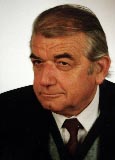
Born: 16 December 1938, Miedniewice, Poland
Died: March 8, 2009, Warsaw, Poland
Early days. Religa finished his studies at the Medical University of Warsaw in 1963.
Career as physician. From 1966 to 1980 he worked in the Szpital Wolski in Warsaw. In 1973, he visited New York to train in vascular surgery, in 1975 he trained in cardiac surgery in Detroit. In 1973, he obtained a Ph. D. degree; in 1981 he finished his habilitation (similar to an associate professor. From 1980 to 1984, Religa lectured at the Warsaw Institute of Cardiology. In 1984 he obtained a chair in cardiac surgery and directed the Cardiosurgical Clinic in Zabrze (Poland), in 1990 he became full professor at the Silesian Medical University in Katowice (Poland), being its rector (president) from 1997 to 1999. In 2001 he returned to Warsaw to become director of both the Clinic of Cardiac Surgery No. 2 and the Institute of Cardiology. A pioneer in human heart transplantation in Poland, he led the team to prepare the first successful heart transplantation in the country, and in June 1995 he was the first surgeon to graft an artificial valve created from materials taken from human corpses.
Career in politics. Parallel to his work as a physician, Religa pursued a career in politics. In 1993, he became a member of the Polish senate and was re-elected in 2001. As the center and right wing of the Polish political landscape has been in constant flux ever since democracy was reinstated, Religa was a member of several parties and organizations. In 1993, he co-founded the Nonpartisan Bloc for Support of Reforms (BBWR) which gathered behind president Lech Wałęsa and was its leader in 1994. In 1995, Religa became the chairman of the short-lived party "The Republicans" (Republikanie) founded by renegade BBWR members who refused to back Wałęsa in the presidential elections of 1995. However, Religa refused to run for president himself, and the Republicans eventually disintegrated when they failed to enter the Sejm in 1997. Spanning the center and center-right of Polish politics, Religa was well placed to play a significant role in the newly created Conservative People's Party (SKL), which became part of the Solidarity Electoral Action (AWS) in 1997. In 2004, Religa was involved in founding the new Centrum Party and was elected to the position of honorary chairman. He was considered a promising candidate in the 2005 Polish presidential elections. In his campaigning, Religa drove on his reputation and image as a successful physician, in January 2005, polls indicated support of more than 65%; in March 2005, with 17%, polls showed him ranking second behind Lech Kaczyński (19%) however as the elections neared he continued to lose support to professional politicians, ending up with only 6% votes in August. On September 2 in a move that gained him great respect in the Polish society, Religa pulled out of the presidential race urging his remaining supporters to vote for Donald Tusk from the Civic Platform. Religa was Minister of Health of Poland in cabinets of Kazimierz Marcinkiewicz and Jarosław Kaczyński.
Personal. He was married to Anna Wajszczuk. Religa was an atheist.
Awards. In 2004, a team led by Religa obtained a prestigious Brussels Eureka award at the World Exhibition of Innovation, Research and Technology for developing an implantable pump for a pneumatic heart assistance system. Religa held honorary doctorates from the Medical University of Lviv (Ukraine), the Silesian Medical University in Katowice (Poland), and the Medical University of Białystok (Poland).
Sources:
modified Wikipedia article
Text is available under the Creative Commons Attribution-ShareAlike License; additional terms may apply.
Other sources:
A new Polish film about Religa
Return to home page:
Prominent Poles